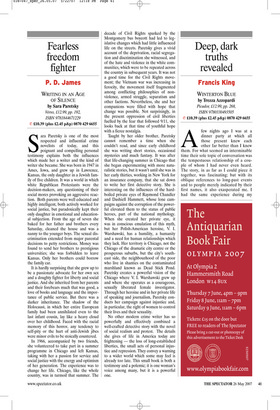Fearless freedom fighter
P. D. James
WRITING IN AN AGE OF SILENCE by Sara Paretsky Verso, £12.99, pp. 192, ISBN 9781844671229 ✆ £10.39 (plus £2.45 p&p) 0870 429 6655 Sara Paretsky is one of the most respected and influential crime novelists of today, and this poignant and compelling personal testimony explains both the influences which made her a writer and the kind of writer she became. She was born in 1947 in Ames, Iowa, and grew up in Lawrence, Kansas, the only daughter in a Jewish family of five children. It was a world in which white Republican Protestants were the decision-makers, any questioning of their social mores provoking an aggressive reaction. Both parents were well educated and highly intelligent, both actively worked for social justice, but paradoxically kept their only daughter in emotional and educational subjection. From the age of seven she baked for her father and brothers every Saturday, cleaned the house and was a nanny to the younger boys. The sexual discrimination extended from major parental decisions to petty restrictions. Money was found to send her brothers to prestigious universities; she was forbidden to leave Kansas. Only her brothers could borrow the family car.
It is hardly surprising that she grew up to be a passionate advocate for her own sex and a doughty fighter for liberty and social justice. And she inherited from her parents and their forebears much that was good, a love of books and language and the importance of public service. But there was a darker inheritance. The shadow of the Holocaust, in which her entire European family had been annihilated even to the last infant cousin, lay like a heavy cloud over her childhood. Faced with the racial memory of this horror, any tendency to self-pity or the hurt of anti-Jewish jibes were minor evils to be stoically countered.
In 1966, accompanied by two friends, she volunteered to take part in a summer programme in Chicago and left Kansas, taking with her a passion for service and social justice with the energy and optimism of her generation. The experience was to change her life. Chicago, like the whole country, was in turmoil that summer. The decade of Civil Rights sparked by the Montgomery bus boycott had led to legislative changes which had little influenced life on the streets. Paretsky gives a vivid account of the deprivation, racial segregation and discrimination she witnessed, and of the hate and violence in the white communities, which were to be repeated across the country in subsequent years. It was not a good time for the Civil Rights movement; the Vietnam war was increasing in ferocity, the movement itself fragmented among conflicting philosophies of nonviolence, armed struggle, separatism and other factions. Nevertheless, she and her companions were filled with hope that change was possible. Not surprisingly, in the present oppression of civil liberties fuelled by the fear that followed 9/11, she looks back at that time of youthful hope with a fierce nostalgia.
Taught by her older brother, Paretsky cannot remember a time when she couldn’t read, and since early childhood she was writing short stories, occasional mysteries and much fantasy. It was after that life-changing summer in Chicago that she began experimenting with more naturalistic stories, but it wasn’t until she was in her early thirties, working in New York for an insurance company, that she sat down to write her first detective story. She is interesting on the influences of the hardboiled private eyes of Raymond Chandler and Dashiell Hammett, whose lone campaigns against the corruption of the powerful elevated them to the status of public heroes, part of the national mythology. When she created her private eye, it was in conscious emulation of this myth, but her Polish-American heroine, V. I. Warshawski, has a humility, a humanity and a need for human relationships which they lack. Her territory is Chicago, not the Chicago of the dramatic city centre or the prosperous suburbs, but the city’s southeast side, the neighbourhood of the poor who live in shanties on the contaminated marshland known as Dead Stick Pond. Paretsky creates a powerful vision of the Chicago where V. I. Warshawski grew up and where she operates as a courageous, sexually liberated female investigator. Through her heroine and in her private life of speaking and journalism, Paretsky conducts her campaign against injustice and, in particular, the right of women to control their lives and their sexuality.
No other modern crime writer has so powerfully and effectively combined a well-crafted detective story with the novel of social realism and protest. The details she gives of life in America today are frightening — the loss of long-established liberties, the small acts of personal injustice and repression. They convey a warning to a wider world which some may feel is already too late. This small book is both a testimony and a polemic; it is one woman’s voice among many, but it is a powerful one.


















































































 Previous page
Previous page